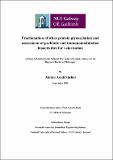| dc.description.abstract | Functional foods are defined as food components that, in addition to their nutritional value, improve human health and/or decrease the risk of diseases. Probiotics, ingested live beneficial bacteria, and prebiotics, the feed for host beneficial bacteria, are included in the functional food category. Beneficial commensal bacteria have profound benefits for human health, including maturation and modulation of the immune system, preventing the attachment of pathogen to the gastrointestinal tract, metabolising indigestible poly- and oligo-saccharides and producing gut health promoting metabolites, including short chain fatty acids. In addition, the consumption of probiotics has been associated with several health benefits, including the decrease in the incidence of diarrhoea in children and mitigation of symptoms of irritable bowel syndrome. Bifidobacterium and Lactobacillus are the most known and applied probiotics.
Bovine milk is a rich source of proteins and glycoproteins, and contains free oligosaccharides. Milk free oligosaccharides are effective prebiotics that support the growth of probiotics. Furthermore, milk proteins have been investigated for their functional effects but the oligosaccharides attached to proteins are underinvestigated. Whey protein, a by-product of cheese making from bovine milk, is a potentially cost-effective source of bioactive proteins and glycoproteins. In recent years whey protein(s) have been the subject of many studies including investigation of their effect on the growth of probiotics and immunomodulation. However, there is still a need to investigate the relationship between whey glycoprotein glycoforms and their potential effects on the growth of probiotics and immunomodulation, which are the main aims of this study.
This study is the first assessment of the relationship between whey glycoprotein glycoforms and their effects on the growth of probiotics and immunomodulation. In addition, the roles of glycans in immunomodulatory effects of WPI fractions were highlighted. Importantly, the metabolites and/or secreted components of a health indicator strain in the presence of WPI fractions were demonstrated to have beneficial immunomodulatory effects. | en_IE |


